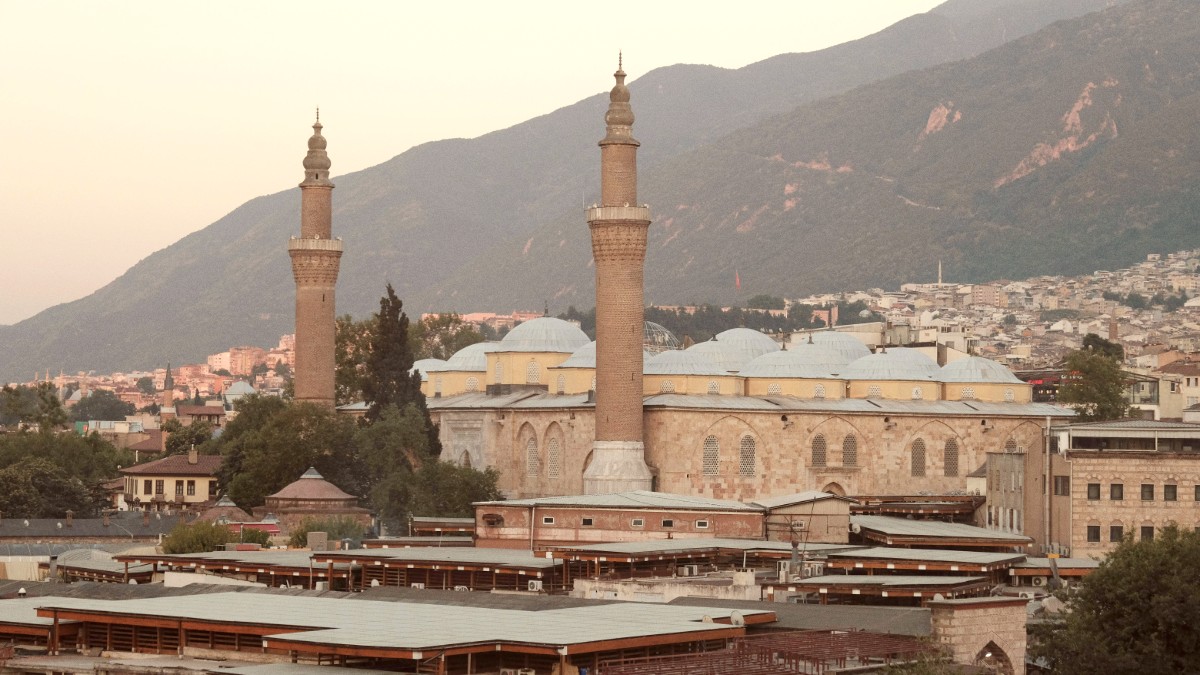
Turkey
Bursa served as the Ottoman capital, influencing its culinary development.
The city’s position at the crossroads of trade routes meant a fusion of flavors and techniques from Anatolia, the Middle East, and Central Asia.
Meals in Türkiye are often social events, and food is enjoyed with family and friends.
Typically an elaborate spread, featuring various cheeses, olives, jams, honey, fresh bread, eggs, and Turkish tea.
It stands polite to accept offered tea, especially in shops or local businesses. It represents a gesture of hospitality.
Bursa's most famous dish: thinly sliced döner kebab meat over pide, topped with hot tomato sauce and melted butter, with strained yogurt.
Find the original at "İskender Efendi Konağı".
Grilled meatballs served on diced pita bread, frequently accompanied by tomato sauce and yogurt.
A local variation on the classic kebap theme.
A hearty white bean stew, a regional specialty of the Black Sea area, frequently served with buttery rice pilaf.
Search for specialized "Kuru Fasulyeci" restaurants.
These feature delicious, homemade-style Turkish meals at very affordable prices, popular with local workers. They represent an authentic and budget-friendly dining experience.
The Bursa Covered Bazaar (Kapalı Çarşı) area has many small eateries and food stalls where you grab a quick bite or a traditional lunch.
Fine dining establishments stay limited in Bursa, found mostly within luxury hotels or in the modern Nilüfer district. These feature elevated Turkish cuisine or international menus with sophisticated ambiance.
Numerous options exist in the mid-range category, featuring traditional Turkish cuisine, various kebap houses, and some international dishes. You find comfortable settings, good service, and a wide selection.
Mainly available in the Nilüfer district, where you find restaurants featuring Italian, Chinese, Japanese, and other international cuisines. These cater to modern residents and expatriates.
While meat remains central to Turkish cuisine, vegetarian options stay available. Search for mezes, salads, vegetable stews, bean dishes, lentil soups, and rice pilafs.
Vegan options represent more challenges but are found by clearly specifying "etsiz" (meatless) and "süt ürünleri yok" (no dairy products).
Awareness of gluten-free (glutensiz) and other allergies rises but is not universal. Communicate your needs clearly.
Rice-based dishes, grilled meats, and vegetables (without sauces or breading) generally stay safer choices. Always double-check ingredients, as cross-contamination occurs.
Use apps like Google Translate to convey dietary restrictions.
Check online reviews for dietary accommodations.
Choose restaurants with English menus and staff.
All meat served in Türkiye stays generally halal.
Opportunities to visit local farms or food producers (e.g., chestnut orchards, olive groves) stay not widely publicized for tourists.
Arranged through specialized eco-tourism or rural tourism operators. These feature insights into the source of Bursa's fresh ingredients.
Bursa hosts seasonal food festivals, especially celebrating its local produce like chestnuts or peaches.
These events present opportunities to taste regional specialties and experience local culture. Check the city's event calendar before your visit.
Enjoying tea or a light meal in the central courtyard of Koza Han (Silk Bazaar) presents an unique historical atmosphere.
Experiencing a traditional Turkish breakfast (kahvaltı) spread is a significant culinary event.
Formal cooking classes specifically for tourists stay limited in Bursa compared to Istanbul.
Opportunities to visit local farms or food producers (e.g., chestnut orchards, olive groves) stay not widely publicized for tourists.
Bursa hosts seasonal food festivals, especially celebrating its local produce like chestnuts or peaches.
Bursa's culinary scene embraces tradition while slowly incorporating modern influences.
Local eateries provide authentic, budget-friendly meals.
Always double-check ingredients for specific dietary needs, especially regarding dairy.
Use translation apps to clearly convey dietary restrictions.
Google Translate's conversation mode or phrasebook proves useful for dietary communication.
Try Şıra (sweet grape juice) with İskender Kebap for a true regional pairing.
Don't miss Kestane Şekeri from dedicated shops like Kafkas or Kardelen.
Bursa's culinary scene embraces tradition while slowly incorporating modern influences.